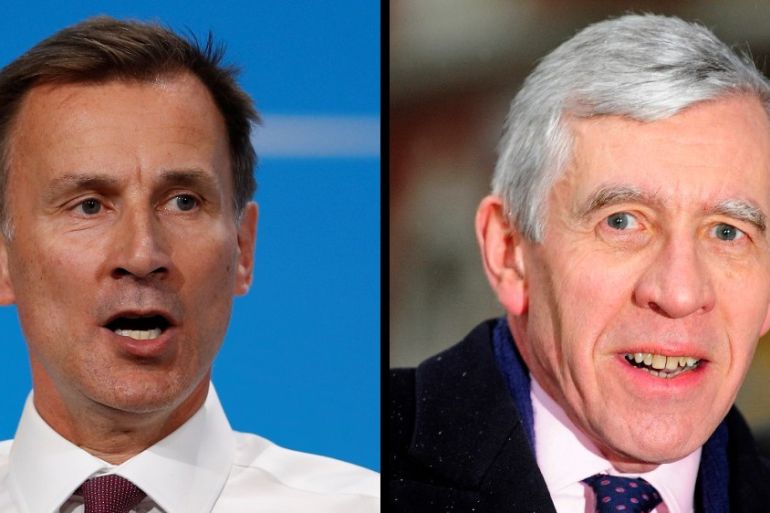UK: Ex-foreign ministers weigh in on Soleimani killing
Jeremy Hunt says lack of consultation showed fraying alliances, while Jack Straw warns of ‘wider consequences’.

Two former United Kingdom foreign ministers have weighed in on the debate over the assassination of prominent Iranian military commander Qassem Soleimani.
Jeremy Hunt said the killing exposed cracks in the Western alliance, while Jack Straw called it a gamble linked to US President Donald Trump’s re-election bid.
Keep reading
list of 3 itemsSoleimani’s remains arrive in Kerman for burial
Pentagon rejects Trump threat to target Iranian cultural sites
Hunt, foreign secretary for a year in Theresa May’s Conservative government, said Washington’s lack of consultation with countries including Britain reflected a growing disregard within the US government towards Europe.
Hunt called for an increase in military spending to stem American disenchantment and claimed the US was subsidising the defence of Europe.
European countries invest around two percent of GDP on defence, whereas the US is the world’s largest military spender, handing over four percent of GDP to the military each year. Annual US military spending is roughly equivalent to the combined spending of China, Saudi Arabia, India, France, Russia, the United Kingdom, Germany and Japan, according to data compiled by the Stockholm International Peace Research Institute.
“If the best the Europeans can manage is half the proportion spent by the US it hardly reassures the hawks in Washington,” Hunt wrote in the Conservative-supporting Daily Telegraph.
“In the end, money matters. If we’re not prepared to cough up we should not be surprised if we are not consulted ahead of big decisions such as the taking out of General Soleimani. Nor should we be surprised if the Western alliance slowly starts to fracture as resentment builds up at European free-riding. To allow that would be a historic mistake.”
‘Wider consequences’
Straw, Labour’s foreign secretary from 2001-06, the years which included the build-up, the invasion and the occupation of Iraq, said in killing Soleimani, Trump had done what other major stakeholders had decided was not worth doing.
Predecessors George W Bush and Barack Obama, along with Israel, had “judged the costs of doing so far outweighed any benefits”, Straw wrote in The Times.
“They were right,” he continues. “Aside from any deaths of American, Israeli, or other Westerners in reprisal for Soleimani’s killing, there will be wider consequences adverse to US and Israeli interests, and beneficial to Iran.”
We should not pretend that we are a significant political player. We are not consulted by the United States and we have no influence over Iran. We can only watch and wait
Rather than a pre-emptive strike against the killing of Americans by Iranian-backed forces, Straw linked the strike to Trump’s re-election bid, and called it a gamble which would “play into the hands of the hardliners in Iran”.
“Whether it all helps President Trump’s re-election remains to be seen,” he wrote. “But if so, what a price to pay.”
Meanwhile, retired diplomat Sir Paul Lever, former chairman of the UK’s Joint Intelligence Committee, concurred with Hunt that Britain – like France and Germany – should not expect to be involved in the US’s manoeuvrings regarding Iran.
“We have interests to protect in the region (by regrouping our forces in Iraq to more defendable locations and by reinstituting convoys in the Strait of Hormuz),” Sir Paul wrote in a letter to The Times.
“But we should not pretend that we are a significant political player. We are not consulted by the United States and we have no influence over Iran. We can only watch and wait. This is the reality of being a middle-sized power.”